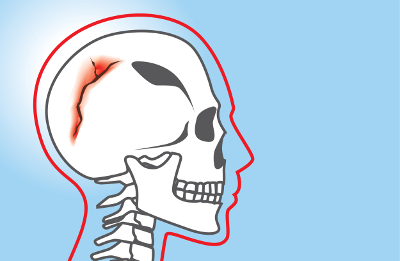 Understanding skull fractures and facial Injuries in Accidents - Compensation Claims
Understanding skull fractures and facial Injuries in Accidents - Compensation Claims
Sustaining a skull or facial injury can be deeply unsettling, as these areas hold significant importance to our well-being and appearance. Such injuries, resulting from accidents like car crashes, sports incidents, or work-related mishaps, often demand specialised medical attention and care.
If you've experienced a skull or facial fracture due to an accident involving another party's negligence, Thompsons' head injury claim solicitors can guide you on your rights and potential compensation entitlements. Contact us for expert advice today.
Compensation amounts for skull and facial fractures
Courts recognise the severity of skull or facial fractures and typically settle claims as follows:
- Cheekbone fracture: £2,040 - £13,340
- Nasal fractures: £1,500 - £20,280
- Jaw fractures: £5,660 - £39,940
- Le fort fracture: £20,330 - £32,200
- Multiple facial fractures: £13,080 - £21,000
Skull fractures, varying in severity, may result in compensation up to £95,000 based on the injury's extent, treatment duration, and long-term impact. Compensation includes 'general damages' for the injury itself and 'special damages' for financial losses.
Facial disfigurement compensation
Facial disfigurement, often accompanying skull or facial fractures, can result in compensation exceeding £85,000, depending on the severity. While past practices considered gender for settlements, current awards are now unbiased. Age might impact awards, with younger claimants experiencing greater psychological effects.
Types of skull fractures
Understanding the types of skull fractures can help assess injury severity:
- Linear: Minor fractures that usually heal without surgery.
- Depressed: Fractures causing inward bone pressure, often requiring surgery.
- Diastatic: Fractures along skull bone connections, common in children.
- Basilar: Fractures at the skull base, often associated with brain or spinal cord damage in road accidents.
Identifying Symptoms of Head Injuries: Understanding Signs Requiring Medical Attention
As a team of seasoned head injury lawyers, Thompsons understands that even seemingly minor head injuries can warrant medical attention. Identifying the potential for serious, long-term brain damage is challenging, making it crucial to act cautiously following any head trauma. Recognising symptoms and seeking medical attention is imperative.
Managing Minor Bruises and Lacerations
Minor bruises can often be treated at home. Applying ice or a cold pack for ten-minute intervals can help. However, if swelling or bruising spreads and affects the eyes, seek immediate medical help.
Cuts and scrapes on the head, despite initial severity, can typically be managed using first aid. However, seek immediate medical attention if the bleeding persists, the wound is deep, or there are signs of a skull fracture.
Head Injury Symptoms in Children Post-Injury
Identifying severe head injuries in young children can be challenging. Look out for signs such as persistent crying, difficulty in walking, head and neck pain, or if the child cannot be woken or remains unconscious. Immediate medical attention is essential in such cases.
Signs Requiring Urgent Medical Assistance
Both adults and children should seek immediate medical help if there are visible skull wounds, abnormal discharges, disturbed speech or vision, unconsciousness, unequal pupil sizes, paralysis, or severe headaches.
Treating Minor Head Injuries
According to the NHS, experiencing headaches, nausea, or confusion for up to two weeks following a head injury is normal. Recovery can be aided by applying ice, rest, stress reduction, and taking paracetamol. Avoid returning to regular activities until fully recovered.
Safety Precautions Following Head Injuries
The NHS advises against activities like driving or playing contact sports for several weeks post-injury. It also warns against alcohol or drug consumption and the use of sleeping pills without medical advice.
Prioritise Safety
Even if external symptoms are absent, potential bleeding or swelling underneath requires attention. The tragic case of Natasha Richardson highlights the importance of prioritising safety despite feeling fine initially after head trauma. Always approach head injuries with caution and seek medical attention when in doubt.
Thompsons' Head Injury Claim Solicitors
Thompsons' experienced solicitors, present across Scotland, offer support in claiming compensation for skull or facial injuries. Representing injured parties exclusively, we secure substantial compensation weekly and win around 90% of cases. Contact us for expert advice and assistance.



